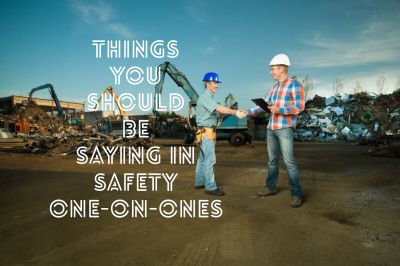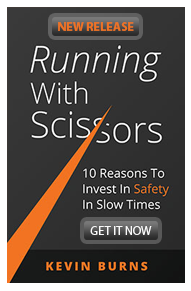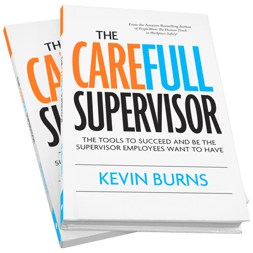Nothing shows your respect for employees like making them feel that they matter.
 Communicating one-on-one is the backbone of solid safety performance improvement. If you don't make the communication personal, you can't possibly make safety personal. So the key to making safety personal is to make the communicartion between supervisor or safety person and front-line employee personal.
Communicating one-on-one is the backbone of solid safety performance improvement. If you don't make the communication personal, you can't possibly make safety personal. So the key to making safety personal is to make the communicartion between supervisor or safety person and front-line employee personal.
There are no tricks to doing this effectively. But there are five things that you really should consider adding to your communications with front-line employees. It will help you build better rapport and open the lines of communication:
1In your experience, how can we make the safety program better? Remember, you're not asking what's wrong with the program. And stop them immediately if they start complaining. That's not the question. Employees have to take ownership of the safety program before they can buy-in to it. Nothing creates ownership faster than having a hand in making it better. It's THE safety program. It's not YOUR safety program. You don't own it. Employees do. So ask them what would make the safety program better. Don't take it personally. Sometimes other people just have better ideas. So ask and listen to the answer.
2What do you think is the best strength you bring to safety on the job? This is a crucial question. If they don't think of themselves as bringing strength to the safety program, then they don't think of safety. But when you ask an employee to consider what they add to the safety program, there is a shift in perspective. It is crucial that all employees feel like they contribute to the safety program. Those who don't, don't think safety matters. It's tough to play on a team when you don't think your contribution matters.
3What is it about your co-workers that you are most proud of? You're asking someone to identify what makes them proud about the people they work with. Pride, quality and safety go hand in hand. If they are not proud of the work they do, they can't be focused on the quality of their work either. Without pride or a concentration on quality, does safely doing the job really matter to them? The very act of thinking about what makes an employee proud of who they work with helps build a solid teams. Teams look after each other.
4What things do you do safely outside of work that you didn't do before? Truthfully, the measure of a solid buy-in to safety is what happens when the employee leaves work. When they buy-in to safety as one of their personal values, they start making different decisions off the job. Maybe they PPE-up when they run their lawnmower. Maybe they do walk-arounds on their own vehicles now. Maybe they back in to a parking space at the mall. Ask them what safety best practices they use off the job. It will cause them to think about safety as not so much about rules as it is about good choices.
5I appreciate you. Or, I appreciate the work you do. Or, I am grateful that you're part of our team. Or, I sure am glad that you bring your "A-game" to work every day. Or, this job would be tougher if you weren't here. People never tire of hearing how much they are valued. So, tell them. If you want them to feel proud of where they work, they have got to hear how proud you are of the work they do. People can't do better if they don't know how well they are doing. So, tell them. And if you can't find something nice to say about them, either you hired wrong, or you're not the right person in the job. Something needs to change.
 When you change the conversation, you change the outcome of the conversation. Supervisors and safety people must get better about connecting with employees instead of just barking rules and orders. These five ideas are meant to build teamwork and communication. If you want to be respected, you have to be willing to respect others. Nothing shows your respect for employees like making them feel that they matter.
When you change the conversation, you change the outcome of the conversation. Supervisors and safety people must get better about connecting with employees instead of just barking rules and orders. These five ideas are meant to build teamwork and communication. If you want to be respected, you have to be willing to respect others. Nothing shows your respect for employees like making them feel that they matter.
Remember the best boss you ever worked for and how he/she made you feel like your contribution mattered. Emulate your best boss. Make people feel like they matter - and they will matter.
Kevin Burns gives engaging, entertaining and inspiring speeches to front-line employees at safety meetings. He also works with supervisors and safety managers on-site or in keynote presentations at conferences. Kevin helps organizations integrate caring for and valuing employees through their safety programs. Kevin Burns is a management consultant, safety speaker and author of 9 books.He is based in Calgary, Canada.
©2016 ZeroSpeak Corporation and Kevin Burns.
No part of this post may be reproduced without the expressed consent of the author.


